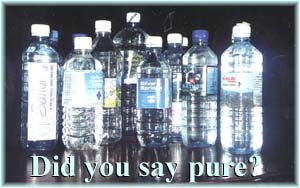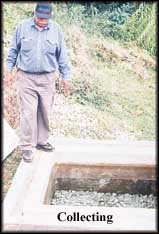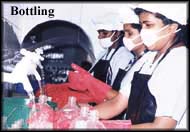 |
 22nd August 1999 |
Front Page| |
These bottles of mineral water look sparkling and clean - But are they? Hiranthi Fernando reportsDid you say pure?
Many of the labels display attractive waterfalls or springs. They also bear the legend "conforms to WHO standards." Yet, there are no compulsory standards enforced in this country for bottled drinking water or bottled natural mineral water. Although the consumer has a wide array of brands of water to choose from, he has no way of knowing which of these brands conforms to satisfactory standards. When The Sunday Times purchased some random samples of bottled water labelled 'Natural Mineral Water', in the market, and tested them at a reputed government laboratory, a bacteriological examination of these eight samples revealed that only two brands, 'Hethersett' and 'Cristal' were satisfactory, showing nil for all types of coliform bacteria. Three samples showed a presence of 11, 21 and 120 colonies of coliform bacteria in 100ml at 37 C. The other three samples, 'Orzone', 'Nikado' and 'Cheer Springs' showed a high coliform bacteria count of over 1100. Six fresh samples were given to the National Building Research Organisation for cross checking. Coliform bacteria were found in all six. Whilst two samples showed counts of 21 and 24, four samples showed high counts of 600, 300, 120 and 100 respectively. The NBRO Coordinator says samples with these high counts of coliform bacteria are not suitable for drinking. Further, she said at the point of bottling, the count must have been even higher. According to several chemical analysts, water containing coliform bacteria is not considered safe since e-coli bacteria is also in the coliform family. The Sri Lanka Standards Institution (SLSI) standard for Bottled Natural Mineral Water, specifies that coliforms should be absent in any 100ml when tested according to the prescribed method. In the standard for bottled drinking water too, a count of over 10 coliforms per 100ml is unacceptable for any sample. A higher limit of 10 coliforms is only allowable in one sample among 10, tested from the same batch. SLSI Director General Ranjit Jayewardena said there were three different standards for water. The standard for Portable Water, SLS 614, published in 1983, applies to water supplied in bulk, such as tap water. A standard for Bottled Drinking Water (SLS 894), published in 1990 is based on bulk water, treated to meet requirements. "There are chemical, physical and bacteriological requirements specified in the standards for drinking water. How they meet the requirements is left to the manufacturer," he said. The standard for Bottled Natural Mineral Water (SLS 1038) of 1995, specifies that the only treatment permitted is filtration and aeration. The source has to be from underground, natural or drilled such as springs, wells, bore holes and not derived from a municipal system or public water supply. "At present these standards are not compulsory," Mr. Jayewardena said. "They are guidelines for the manufacturer to follow in order to provide a good product to the consumer. "Any producer who wants to show the consumer he is supplying a product meeting the SLSI standards, can apply for the SLS mark. Under the Food Law of the Ministry of Health, manufacturers have to conform to minimum standards which have been gazetted. Food Inspectors and Public Health Inspectors (PHI) in the country can take samples from the market and test them for quality." However, these same inspectors have to monitor the quality of every food item in the market. Dr. Manilal Fernando of the Ministry of Health said there were no specific regulations governing water but a joint WHO/FAO collaborations on standards of various food items, Codex Alimentarious Commission is used as the guideline. "We go by the Codex standard unless there is a specific deviation," Dr. Fernando said. He explained that the ministry sets the standards and regulations of the Food Act. The Chief Food Authority is the Director General of Health. The local authorities are vested with the powers of granting approvals and implementing the regulations. Health Department officers work in the local authority areas under a Medical Officer of Health (MOH). "We are in the process of revising the Food Act and regulations," Dr. Fernando said. "We are working on including bottled water specifically as one of the risk items in the new regulations. Several cases of substandard water have been found at the provincial level." Under the labelling regulations of the Food Act, certain information such as the common name describing the product, date of expiry, and net contents should be given on the labels in two languages. The list of ingredients, additives, code number, batch number, name and address of manufacturer or distributor are mandatory in one language. The size of letters to be used is also prescribed. Misleading labels are not permitted. Dr. Tissa Seneviratne, Chief Medical Officer of Health (MOH) of the Colombo Municipal Council says that the government and local authorities are concerned about the bacteriological and chemical quality of bottled drinking water. Each of the six MOH areas in the city has a food inspector, who collects samples of food and water at random from sales outlets. The CMC has its own City Analyst's laboratory. Samples from outside are tested at the Government Analyst's Department or three other labs at Kandy, Kalutara and Anuradhapura. According to the City Analyst Mr. Warnakulasuriya, of 15 samples of bottled water tested last year, two samples were of poor quality, containing excessive ammonia. If a ratepayer finds bottled water of dubious quality, he/she can inform the MOH of the area, and the food inspector will collect it for testing. They can also take it to the Town Hall. The Sunday Times spoke to several producers of bottled mineral and drinking water in the country. They say there are over 50 brands of bottled water in the market. Most of them claim that their water is mineral water from a natural spring. They also claim that regular testing is done at a reputed laboratory. However, there is no guarantee that what is specified on the label is true. Even reputed establishments like Maliban Mineral Waters, carry misleading labels, displaying an attractive mountain waterfall, when the water source is in reality, a well in Colombo. Many of the well established bottlers we spoke to, were in favour of having better controls and a compulsory mark on the label after regular testing by the SLSI. They feel it is necessary for the protection of the consumer since there are so many spurious brands in the market, undercutting the genuine products in price. However, they felt that the bureaucracy of standardisation and the high cost of testing are drawbacks, particularly due to the low profitability of the producer. The market is so competitive that the manufacturer cannot charge more. The bulk of the money is made by the retailer. A producer, who has been a water treatment specialist since 1979, says that it is only in the last 10 to 15 years that technology has developed to test for traces of pesticides, toxic chemicals and heavy metals in water. Public supplies worldwide have limitations since such contaminants are difficult to detect in a public supply and too expensive to treat. More people thus are turning to bottled water. To ensure the quality of bottled water, frequent checking of the equipment is also necessary, in addition to regular testing. In his plant, the entire system is stripped and cleaned thoroughly once a week. Filters, taps, pipelines and valves can all accumulate micro organisms which could contaminate the water even if the water source is pure. Contamination through equipment could be detected by regular laboratory testing. Several of the water bottlers we spoke to claimed that they get their products tested at the CISIR, now known as the Industrial Technology Institute (ITI). Dr. Nirmala Pieris, Head of the Corporate Division of ITI said that they carry out bacteriological as well as physical and chemical tests on water based on the SLS standard specifications. She recommends regular testing for bottled water, to ensure quality. Manufacturers are permitted to carry the CISIR approval mark on their labels only if samples are tested by them regularly each month. At present, ITI has a contract for monthly testing only with Aitken Spence & Co. which produces the brand 'Hethersett'. "So far, no company has obtained the SLS mark for water," said Ranjit Jayawardena of SLSI. "Before we give the SLS mark, we ensure that the manufacturer has the capability to maintain standard products. He must have quality control facilities like a small lab, in his premises. The production is monitored and has to conform to standards continuously. This is the only positive way a consumer can identify a good product. The annual fee for getting the SLS mark is .05% of the turnover. It is up to the government to make the SLS mark compulsory for bottled drinking water under the Consumer Protection Act, as it has been done for some other food products where many complaints have been received.
The Producers say...The Sunday Times spoke to the management of the companies, whose samples showed the presence of bacteria. Manager of Cheer Springs Suranga Abeyratne said their water source is a tube well at Hokandara. He said they test the water every two months at the Water Board. According to him, the Water Board is treating their water and checking on their equipment. Since the label on the sample did not carry a mandatory batch number, Mr. Abeyratne said he would buy a sample from the same supermarket and have it tested. The Chief Chemist at the Water Board laboratory, however, denied they had any contract with the Cheer Springs brand. A.A.D. Gunawardene, the Nikado Mudalali, was very concerned that the water marketed by his company had shown the presence of bacteria. He said their bottling company is Watercor Mineral Water Co. at Haliella. Nikado only does the marketing of the water. Mr. Gunawardene said he was keen on obtaining the SLS mark for the water two years ago. At the time, SLSI were not ready with the mark. "I am very happy you told me about this. I will contact the SLSI and find out how we can get the SLS mark on our bottles. I am also keen on finding out the procedures for testing a sample of each batch we buy in our own lab," Mr. Gunawardene said. Managing Director of Watercor Upul Senarat said he has put in the finest equipment from the United States. He bottles his own brand 'Orzone' as well as supplying Nikado. A chemistry graduate, he says he can vouch for the quality of his water. He subsequently faxed us a copy of a test report obtained from the Water Board regional lab at Bandarawela, which showed nil coliforms. However, he said the quality of the pet bottles and the lids available are not up to standard. If the lid is defective, bacteria could enter, he said. He is also working on introducing an imported wrap round the lid to prevent adulteration or contamination of the water. Roland Abeygunawardene, Manager of the Maliban Mineral Water Co., said he could not understand how their water could have shown the presence of bacteria. He said they have a comprehensive testing procedure. The water is tested at Bamber & Bruce as well as at the MRI, he said.
This is my Sprout
The water is collected in a covered concrete tank about twenty feet away from the source. It is filtered through lime stone rocks lining the bottom of the tank. The crystal clear water is led by pipes into two Arpico tanks and then by pipes laid underground to the bottling plant which lies fifty feet below. A motor is used to pump the water faster. "In the history of this 'ulpotha', it has never run dry," said Mr. Odayar, a retired planter who purchased the estate in 1991. The water bottling plant was started in 1995. It was his son Reza who had the idea of tapping the water from the spring for bottling. He had a sample tested at the CISIR and obtained a very good report. And so the water bottling industry started with Reza at the helm. Inside the factory, the walls are lined with white tiles. The water goes through a charcoal filter, a sand filter, and three micron filters.
The filled bottles are passed on to the labelling section. Fifteen girls work on an eight-hour shift basis. For a day they bottle 6000 bottles of 500ml or 2800 large bottles of 1.5. litres. "The large 1.5 litre bottle costs Rs.9/-," Mr. Odayar said. "We sell it at Rs. 19.50. The small one sells at Rs. 10.50. In Sri Lanka it is the middleman who makes the money on bottled water, not the producer." In addition to supplying bottled water to the majority of five-star hotels in the island, and the supermarkets, Sprout Lanka exports bottled mineral water to the Maldives and Ukraine. An order to the United Arab Republic (UAR) has also been obtained recently. Reza Odayar, Chairman of the company, said they export five containers of bottled water per month. Sprout bottles their water under different labels for export to the Maldives. He said their water is tested at the CISIR, Bamber & Bruce and SGS, a Swiss based company, once in two months. He welcomes the idea of a compulsory standard for bottled water in order to ensure that quality is maintained. |
||
 |
Front Page| News/Comment| Editorial/Opinion| Business| Sports | Mirror Magazine |
|
 |
Please send your comments and suggestions on this web site to |
|
 Bottled
Natural Mineral Water is the trend today in drinking water. Hotels, restaurants,
supermarkets, as well as the little grocery stores on the street, all sell
a variety of brands of drinking water in pet bottles in three standard
sizes.
Bottled
Natural Mineral Water is the trend today in drinking water. Hotels, restaurants,
supermarkets, as well as the little grocery stores on the street, all sell
a variety of brands of drinking water in pet bottles in three standard
sizes. A
spring of clear water emerges from the ground and flows down the mountain.
Above is a pine forest. There is no habitation for twenty miles around.
This natural spring, located at Anguruwella Estate, Hunnasgiriya, in the
heart of the Knuckles mountain range, is the source for the Sprout Natural
Spring Water bottling plant.
A
spring of clear water emerges from the ground and flows down the mountain.
Above is a pine forest. There is no habitation for twenty miles around.
This natural spring, located at Anguruwella Estate, Hunnasgiriya, in the
heart of the Knuckles mountain range, is the source for the Sprout Natural
Spring Water bottling plant.  It
is then passed through a ultra violet disinfection system to kill any bacteria.
After sterilization, the water is taken through a plastic pipe, to four
taps. Girls clad in overalls, aprons, caps, gloves and masks fill plastic
bottles at the taps and cap them.
It
is then passed through a ultra violet disinfection system to kill any bacteria.
After sterilization, the water is taken through a plastic pipe, to four
taps. Girls clad in overalls, aprons, caps, gloves and masks fill plastic
bottles at the taps and cap them.